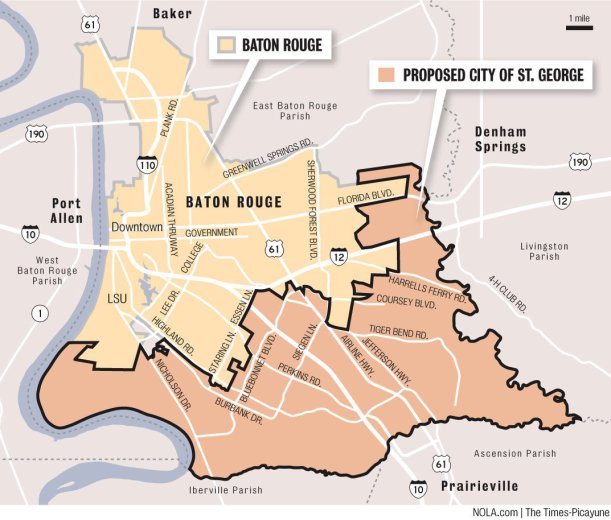One of my housemates grew up in Baton Rouge, LA and, while she’s shared several fascinating tales of shooting a gun at the age of eight, eating crawdads by the pound and dancing til dawn at Mardi Gras festivities, one of the most intriguing stories she shared was one about a group of Baton Rouge residents who want to break away and start their own city. “St. George,” they’re calling it, and you might be able to guess their motives from that pompous title.
Nabbing up more than half of the geographic area in Baton Rouge, St. George would encompass the southern, middle class, white part of the city and ensure that wealth went only to schools in this enclave—cutting out the northwestern section of the city which is lower income and predominantly African American. Residents of the St. George area claim to generate two-thirds of the city’s tax revenue and they want to keep that for themselves. However, as an article in the Louisiana Times-Picayune explains, much of this revenue is from people outside of the area who come in to frequent its casinos, big box stores and mall. Like hundreds of American cities, especially in the south, Baton Rouge is home to glaring racial and economic divisions, and the proposed renegade city brings these divisions into brightest light.
The task of splitting a city down the middle also opens a Pandora’s box of budgetary and governance complications. For example: Will St. George contract their garbage and recycling pick-up out to Baton Rouge, or start their own service? Who pays the pension funds of Baton Rouge employees if St. George secedes? And how would over 10,000 public school students within the St. George boundaries fit into a mere handful of public schools in their new city? These are just a few examples of the myriad details that require smoothing when you create a new city.
To start it legally, St. George organizers will have to get signatures from “one fourth of the registered voters in the St. George area […and then get] a majority vote in favor of forming the city.” The catch is that only residents of that area partake in the vote. My Louisianan housemate asserts that this racist pipedream is unlikely to come to fruition for St. Georgians, but it does highlight the stark divide between northern and southern residents of Baton Rouge.
This campaign in Louisiana also holds wider implications for cities around the world that are home to stratified neighborhoods and segregated streets—i.e. almost every city I can think of. When wealthier residents get it into their heads that they can just cut out the citizens they don’t want to share with, they contribute to the already-skyrocketing class disparities in the world and they dismantle the already-delicate fabric of today’s cities.
What do you think? Should cities be able to break away in this manner? How can we promote unity within our cities instead?
Graphic from this article

